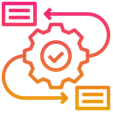Why Should Businesses Use Data Analytics?
In today’s data-driven world, information is power. Companies that effectively analyse data gain a significant edge in understanding their market, consumers, and ultimately, their path to success.
Turning Insights into Action
By analysing this data, data analysts provide key insights that empower businesses to:
- Make informed decisions: Data-driven decisions are less prone to guesswork and lead to better outcomes.
- Optimise marketing campaigns: Target the right audience with the right message at the right time.
- Improve customer experience: Understand customer needs and preferences to personalise interactions and boost satisfaction.
- Predict future trends: Anticipate market shifts and adapt business strategies proactively.
What’s the Advantage of Hiring a Freelance Data Analyst?
Data analysis is crucial across all industries, from retail to healthcare to education. But building a dedicated data team can be costly and time-consuming. Hiring freelancers offers faster onboarding, up to 60–80% cost savings, and access to global, on-demand expertise.
AI Analytics for Business Growth
By integrating ai analytics into your data strategy, you gain the ability to perform dynamic, adaptive analysis. This leads to deeper, predictive insights, enhancing decision-making processes and strategic business moves. AI not only processes data at scale but also learns from it, offering you an edge in market competition.
Pangaea X: Your Bridge to Top-Tier Freelance Data Analysts
This is where Pangaea X steps in. As the best online freelance platform, We connect you with a vast pool of skilled and experienced freelance data analysts. Where You can:
- Find the Perfect Match: Browse profiles, filter by expertise, and hire data analysts with the specific skills your project requires.
- Cost-Effective Solutions: Scale your data analysis needs by hiring freelancers on a project basis, optimising your budget.
- Greater Flexibility: Access a global talent pool and find data analysts with the specific industry experience you need.
Leveraging AI for Data Analysis
Through Pangaea X, you connect with freelancers who are adept in data analyst ai techniques. These experts weave ai tools for data analysis into your data workflows, ensuring that you’re at the forefront of ai data analytics. This integration transforms your data into a strategic asset, enabling you to make informed decisions with confidence.
Related Article
Why Choose Pangaea X as your Trusted Partner ?

Quality & Verified Talent

Project Matching Expertise

Streamlined Workflow

Cost-Effectiveness

Scalability and Flexibility
Freelancer Data Analysts Ready to Work
How Data Analysis Projects Turned into Success Stories
Frequently Asked Questions
What types of data analysis projects can freelance data analysts handle?
- Data cleaning and wrangling
- Exploratory data analysis (EDA)
- Statistical analysis
- Data visualisation
- Building dashboards and reports
- Machine learning and predictive modelling (depending on skill set)
What are the benefits of hiring a freelance data analyst?
- Flexibility and adaptability to project needs
- Specialized skills for in-depth analysis
- Cost-efficiency compared to full-time hires
What skills and experience should I look for in a freelance data analyst?
- Proficiency in data cleaning and wrangling tools (e.g., Python libraries)
- Knowledge of statistical analysis methods
- Experience with data visualisation tools (e.g., Tableau, Power BI)
- Excellent communication and problem-solving skills
- Experience working in your specific industry (if relevant)
What is my typical budget for hiring a freelance data analyst?
How do I ensure a successful project with a freelance data analyst?
- Clearly define your project scope and goals before hiring a freelancer.
- Communicate your expectations clearly and provide access to necessary data.
- Establish regular communication channels and hold progress meetings.
- Provide constructive feedback throughout the project.
How can AI Data Analysts help my business grow?
Get your data results fast and accelerate your business performance with the insights you need today.












